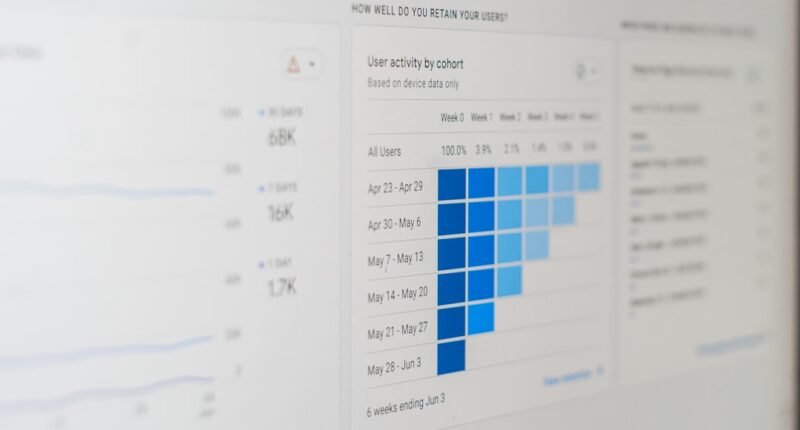WordPress is a widely-used, open-source content management system that enables users to create and manage websites efficiently. Its popularity among bloggers and website owners stems from its user-friendly interface and customizable features, which allow for the creation of functional websites without extensive coding knowledge. WordPress caters to both beginners and experienced users, offering a range of tools and resources for building and maintaining successful blogs.
The platform provides a variety of themes, plugins, and widgets that can be tailored to meet specific requirements. WordPress also offers multiple hosting options to accommodate different needs. Its intuitive dashboard and editor simplify content creation, publication, comment management, and performance tracking.
The responsive design ensures that blogs are optimized for various devices, including desktop computers and mobile phones. WordPress’s versatility and robust features make it an attractive choice for bloggers seeking to establish a professional and engaging online presence. Its extensive customization options, combined with its ease of use, have contributed to its widespread adoption in the blogging community.
Key Takeaways
- WordPress is a popular website builder for bloggers due to its user-friendly interface and customizable features.
- Using WordPress for blogging offers benefits such as easy content management, a wide range of themes and plugins, and strong community support.
- WordPress supports influencer marketing for bloggers through its ability to create engaging content, build a strong online presence, and connect with a larger audience.
- WordPress plays a crucial role in digital marketing for bloggers by providing tools for email marketing, social media integration, and analytics tracking.
- The SEO capabilities of WordPress, including customizable permalinks, meta tags, and XML sitemaps, make it a powerful platform for bloggers to improve their search engine rankings.
- When comparing WordPress with other website builders, bloggers should consider factors such as ease of use, customization options, and scalability.
- Tips for utilizing WordPress to build a successful blog include choosing a responsive theme, optimizing for mobile devices, and regularly updating content to engage readers.
The Benefits of Using WordPress for Blogging
User-Friendly Interface
One of the key advantages of WordPress is its user-friendly interface, which makes it easy for bloggers to create and manage their websites without the need for extensive technical knowledge. With its intuitive dashboard and simple editor, WordPress allows bloggers to focus on creating high-quality content without getting bogged down in the technical details of website management.
Customization Options
Additionally, WordPress offers a wide range of themes and plugins that can be easily customized to suit the unique needs of each blogger. Whether you are looking to create a personal blog, a professional portfolio, or an e-commerce site, WordPress provides the tools and resources you need to bring your vision to life.
Flexibility and Scalability
Another benefit of using WordPress for blogging is its flexibility and scalability. As your blog grows and evolves, WordPress can easily adapt to meet your changing needs. Whether you want to add new features, change the design of your website, or expand your online presence, WordPress offers the flexibility to make these changes with ease. Additionally, WordPress provides bloggers with a range of hosting options, ensuring that you can find the right solution for your website’s needs.
Responsive Design and Mobile-Friendliness
With its responsive design and mobile-friendly features, WordPress also ensures that your blog looks great on any device, helping you reach a wider audience and engage with your readers more effectively.
How WordPress Supports Influencer Marketing for Bloggers

Influencer marketing has become an essential strategy for bloggers looking to grow their online presence and reach a wider audience. WordPress provides a range of tools and resources to support influencer marketing efforts, making it easier for bloggers to connect with brands and collaborate on sponsored content. With its customizable features and flexible design options, WordPress allows bloggers to create engaging and visually appealing websites that showcase their unique brand and personality.
This makes it easier for influencers to attract the attention of potential partners and demonstrate the value they can offer as brand ambassadors. WordPress also offers a range of plugins and integrations that can help bloggers manage their influencer marketing campaigns more effectively. From social media integration to email marketing tools, WordPress provides bloggers with the resources they need to promote their content and engage with their audience.
Additionally, WordPress offers robust analytics and tracking features, allowing influencers to measure the success of their marketing efforts and make data-driven decisions about their future strategies. With its support for influencer marketing and brand collaborations, WordPress empowers bloggers to take their online presence to the next level and build meaningful partnerships with brands that align with their values and interests.
WordPress and its Role in Digital Marketing for Bloggers
Digital marketing is essential for bloggers looking to grow their online presence and attract a larger audience. WordPress offers a range of features and tools that support digital marketing efforts, making it easier for bloggers to promote their content and engage with their audience. From search engine optimization (SEO) tools to social media integration, WordPress provides bloggers with the resources they need to create a comprehensive digital marketing strategy that drives traffic and boosts engagement.
With its customizable design options and responsive layout, WordPress also ensures that your blog looks great on any device, helping you reach a wider audience and maximize your digital marketing efforts. WordPress also offers a range of plugins and integrations that can help bloggers optimize their digital marketing campaigns. Whether you are looking to improve your website’s performance, track user behavior, or automate your marketing efforts, WordPress provides the tools you need to achieve your goals.
Additionally, WordPress offers robust analytics and reporting features, allowing bloggers to measure the success of their digital marketing efforts and make data-driven decisions about their future strategies. With its support for digital marketing, WordPress empowers bloggers to create compelling content, promote their brand effectively, and build meaningful relationships with their audience.
SEO Capabilities of WordPress for Bloggers
Search engine optimization (SEO) is crucial for bloggers looking to improve their website’s visibility and attract more organic traffic. WordPress offers a range of built-in SEO features that make it easier for bloggers to optimize their content and improve their website’s search engine rankings. From customizable permalinks to meta tags and descriptions, WordPress provides bloggers with the tools they need to create SEO-friendly content that ranks well in search engine results pages (SERPs).
Additionally, WordPress offers a range of SEO plugins that can further enhance your website’s SEO capabilities, allowing you to optimize your content, track keyword rankings, and improve your website’s overall performance. WordPress also offers responsive design options that ensure your website looks great on any device, which is essential for improving your website’s SEO performance. With more users accessing the internet on mobile devices, having a mobile-friendly website is crucial for improving your search engine rankings and providing a positive user experience.
Additionally, WordPress provides bloggers with the ability to create XML sitemaps, which make it easier for search engines to crawl and index your website’s content. By leveraging these SEO capabilities, bloggers can improve their website’s visibility, attract more organic traffic, and grow their online presence more effectively.
Comparing WordPress with Other Website Builders for Bloggers

Customization and Scalability
With its open-source nature and extensive library of themes and plugins, WordPress offers bloggers the ability to create highly customized websites that meet their unique needs.
Hosting Options and E-commerce Functionality
Additionally, WordPress provides bloggers with a range of hosting options, ensuring that they can find the right solution for their website’s requirements. Another key difference between WordPress and other website builders is its support for e-commerce functionality. While platforms like Shopify are designed specifically for e-commerce websites, WordPress offers a range of plugins and integrations that allow bloggers to add e-commerce features to their websites.
SEO Capabilities and Monetization
This makes it easier for bloggers to monetize their content and sell products or services directly from their website. Additionally, WordPress provides bloggers with robust SEO capabilities that may not be as comprehensive on other website builders, making it easier for them to improve their website’s visibility and attract more organic traffic.
Tips for Utilizing WordPress to Build a Successful Blog
Building a successful blog with WordPress requires careful planning and strategic execution. To make the most of this powerful platform, bloggers should focus on creating high-quality content that resonates with their target audience. By understanding their audience’s needs and interests, bloggers can create compelling content that drives engagement and encourages repeat visits.
Additionally, bloggers should take advantage of WordPress’s customizable design options to create a visually appealing website that reflects their brand identity and personality. In addition to creating great content, bloggers should also focus on promoting their blog effectively using digital marketing strategies such as SEO, social media marketing, and email marketing. By leveraging WordPress’s built-in SEO features and plugins, bloggers can improve their website’s visibility in search engine results pages (SERPs) and attract more organic traffic.
Social media integration tools also allow bloggers to promote their content across various platforms and engage with their audience more effectively. Finally, email marketing tools can help bloggers build a loyal subscriber base and keep their audience informed about new content and updates. In conclusion, WordPress is an ideal platform for bloggers looking to create a successful online presence.
With its user-friendly interface, customizable design options, support for influencer marketing and digital marketing efforts, robust SEO capabilities, and flexibility compared to other website builders, WordPress provides bloggers with the tools they need to build a compelling blog that attracts a wider audience and drives engagement. By following these tips and leveraging the full potential of WordPress’s features, bloggers can create a successful blog that stands out in the crowded online space.
FAQs
What is WordPress?
WordPress is a popular content management system (CMS) that allows users to create and manage websites and blogs. It is known for its user-friendly interface and customizable features.
Is WordPress a good choice for bloggers?
Yes, WordPress is a great choice for bloggers due to its flexibility, ease of use, and wide range of plugins and themes specifically designed for blogging.
What are the benefits of using WordPress for blogging?
Some benefits of using WordPress for blogging include its user-friendly interface, customizable themes and plugins, search engine optimization (SEO) capabilities, and the ability to easily manage and organize content.
Can WordPress be used for other types of websites besides blogs?
Yes, WordPress can be used to create a variety of websites including e-commerce sites, business websites, portfolios, and more. Its versatility makes it a popular choice for many different types of websites.
Are there any downsides to using WordPress for blogging?
Some potential downsides of using WordPress for blogging include the need for regular updates and maintenance, potential security vulnerabilities if not properly managed, and the learning curve for beginners.
Is WordPress free to use for blogging?
WordPress itself is free to use, but users may incur costs for web hosting, domain registration, premium themes, and plugins. However, there are also many free themes and plugins available for use.






